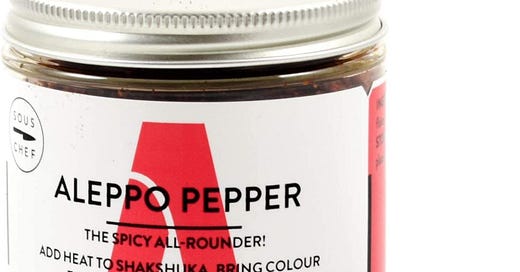Will Syria ever be able to reclaim its spice?
Aleppo pepper no longer hails from its namesake region. Will this luscious spice ever be produced in Syria again? Or has the war made it Aleppo pepper in name only?
Hello and thank you SO MUCH for finding your way to Pen and Spoon. This week’s newsletter is for paid subscribers only, so most of it is behind a paywall. For just £4 a month (or less if you take out an annual subscription) you can read this and every newsletter I write - that’s FOUR newsletters each month. Your subscription helps to support the enormous amount of work that goes into researching and writing them, plus you get extra recipes, special offers and access to a community of food-loving folk. Free subscribers receive TWO of my newsletters each month. Either way, thanks for supporting me and I hope you enjoy the post.
The other day I finished off a pot of Aleppo pepper, the gently fruity, slightly salty red chilli flakes with a soft kiss of heat. It’s my go-to dried chilli that sits next to the olive oil and salt on my kitchen bench. A ruby shower goes onto and into so many things I cook and eat, from hummus and yoghurt to fragrant lamb stews and dressings. But I have to admit I’ve never really given its provenance much thought.
Aleppo pepper (also known as pul biber and Turkish pepper) is named after the area in and around the Syrian city where, traditionally, it’s been grown and processed. A variety of Capsicum annuum, it’s a plump red pepper, mild and sweet, that’s deseeded, dried and salted, then flaked and rubbed in oil. This process gives the finished product a pleasing, almost waxy texture. But the future of the authentic Syrian product is in jeopardy.
Keep reading with a 7-day free trial
Subscribe to Pen and Spoon to keep reading this post and get 7 days of free access to the full post archives.





